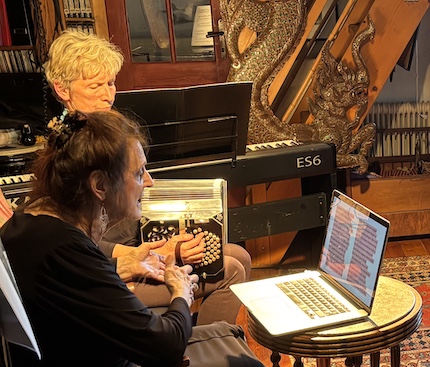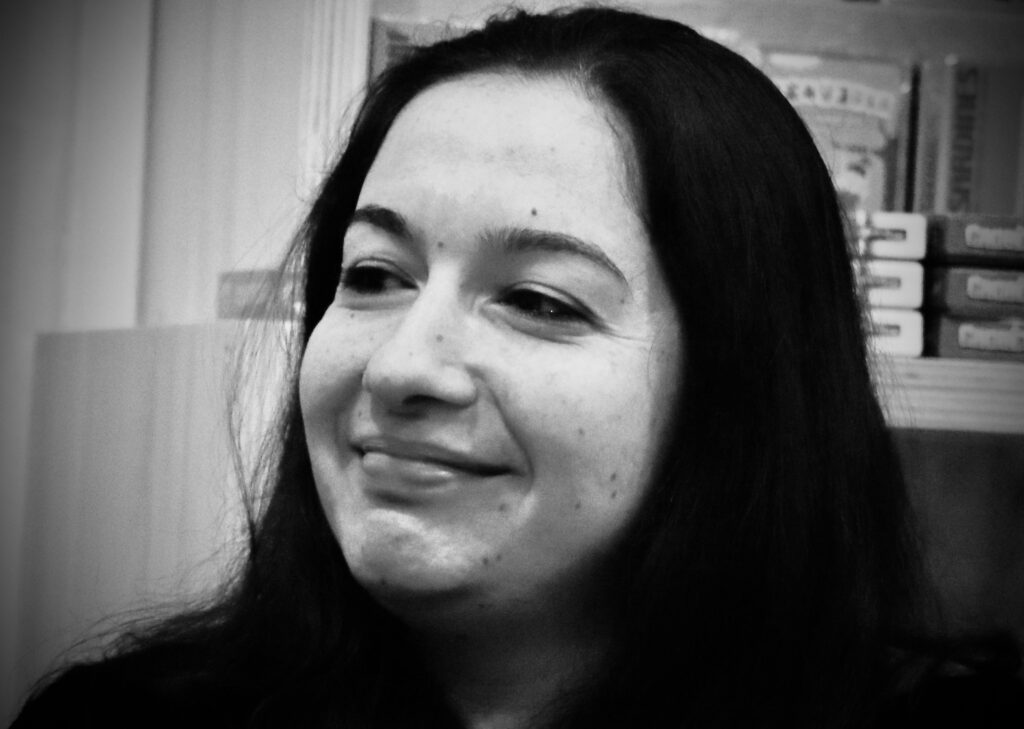Fernanda Melchor (cc)
VERACRUZ IS Spelled with a Z (Fernanda Melchor), read by Irmi Horn, with musical accompaniment by Eva Jiménez (Bandoneon)

Irmi Horn & Eva Jiménez
Eva Jiménez – born in 1959, completed numerous training courses and further education at the Graz Conservatory and the University of Music and Performing Arts Graz, as well as through seminars and private studies. Her musical focus is on jazz, Latin jazz, and tango nuevo. She has been composing since 2001 and writes lead sheets and arrangements.
She usually performs her own music on the bandoneon or piano, preferably together with other instruments/musicians, such as tevango.at. She has a particular affinity for (free) improvisation.
Irmi Horn, born July 4, 1945, lives in Graz after studying and teaching, working at various theaters and in the independent arts scene as a playwright, director, actress, curator, and artistic director of kunstGarten.
Fernanda Melchor, born in 1982 in Veracruz, Mexico, is one of Latin America’s most important authors. Her novel *Hurricane Season* won her the Anna Seghers Prize and the International Literature Prize of the Haus der Kulturen der Welt in 2019. She was also shortlisted for the International Booker Prize. As a journalist in Veracruz, she wrote “CrĂłnicas,” a unique Latin American hybrid of subjective reportage, investigative journalism, and fiction—these CrĂłnicas were incorporated into Melchor’s debut novel, *This Is Not Miami* (2013). The remarkable aspect of this debut, however, lies less in its complex depiction of the miserable living conditions of young people on the margins of society than in the distinctive linguistic expression with which Melchor creates a hyperrealistic narrative space.
The writer Fernanda Melchor, born in 1982, comes from the Mexican state of Veracruz. When the trained journalist declined to investigate a murder case in a Mexican province for fear of endangering herself in a region controlled by drug producers, this caution led to one of the most remarkable novels of recent contemporary literature. It is called *Season of Hurricanes*.
This novel—her third—is set in the fictional village of La Matosa near Veracruz. There, a witch resides, onto whom the villagers project their fears and hopes—until she is found murdered. The story takes place in the 21st century, in an archaic world, the kind that must have fostered the rise of Stoicism, the hope for freedom from passions, for serenity as the foundation of culture. All feelings, all emotions are equally intense: love is intense, fear is intense, the urge to kill is intense, and fear helps love to transform into murder. The characters in the novel are at the mercy of their emotions like the weather; they work their way through them, they want to leave, to escape their village, to escape themselves. They limp after their instincts, unwilling to go where those instincts already lead, yet compelled to, leaving a trail of devastation in their wake.
Fernanda Melchor’s characters have no access to culture, to education, no access to the money that could provide them with either. They have no way to liberate themselves and live with dignity. And: It is a highly developed, highly complex civilization that has relegated people to this pre-civilized state and keeps them trapped there. It is—rather by chance—the centrifugal forces of the global oil industry to which the characters in their village are exposed. And the world markets do not depend on the people who consume them possessing culture. They do not depend on the people who consume them not dying. And they consider themselves highly cultured. This cultured world is absent here. The reality that Fernanda Melchor presents to us is one of poverty and merciless exploitation.
Fernanda Melchor has decided to fictionalize real events as a form of self-protection. She has found her own language for this, a poetically almost unbearably dense hyperrealism. The novel describes nothing less than a hell on earth in our time. It reaffirms the necessity of literature—as a means of grasping a reality that, if necessary, violently resists being described, a reality that is ultimately artificial. Freedom means being able to express something in language. Being able to express crime in language is a victory of culture over crime.
Already in her collection of stories, *Aquà no es Miami* (2013), Fernanda Melchor tells of human degradation in all its shades from the perspective of a survivor, and her most recent book, *Páradais* (2021), also explores, through the story of two teenage outcasts who meet at night in an upscale neighborhood to play a macabre game, a violence that almost inevitably results from the collision of unequal worlds.

